

In this week's Journal The English Apple Man reviews more of the presentations from last week's 'Virtual' National Fruit Show
Below: left; NFS President Teresa Wickham and right; NFS Chair Sarah Calcutt
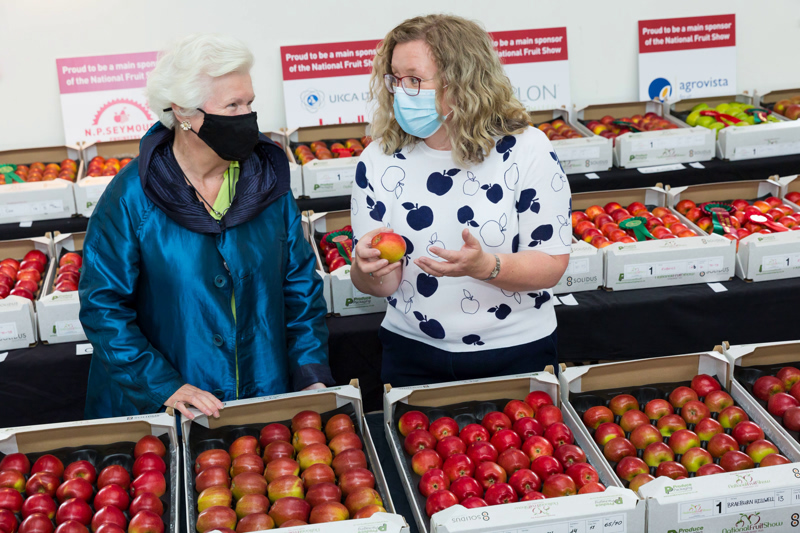
Last week we touched on the judging held at Marden Hockey Club and this week The English Apple Man features the judges at work.
Below: The support of Sponsors is critical for a successful show; featured sponsors and show fruit
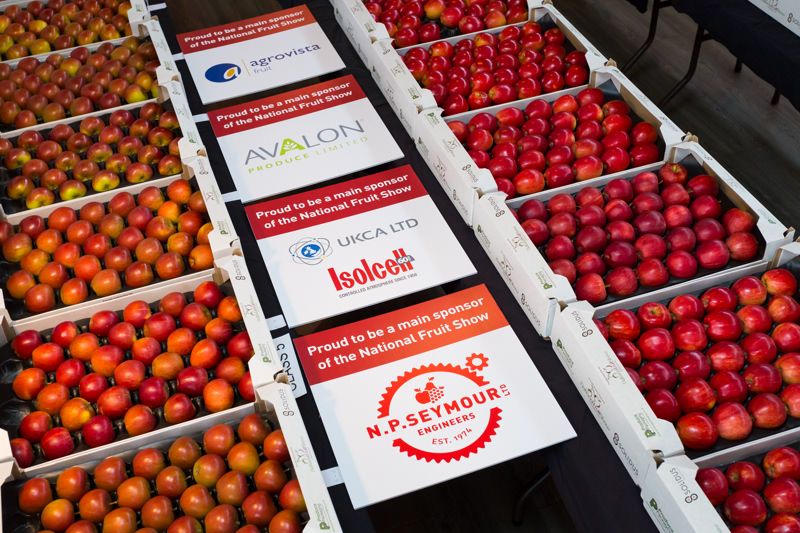
Below: left; 'Keeping safe with a COVID' temperature check and right; Chief Steward Brian Tompsett
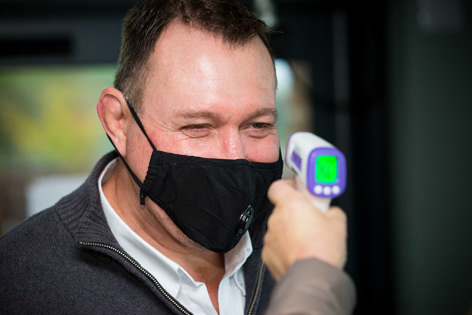
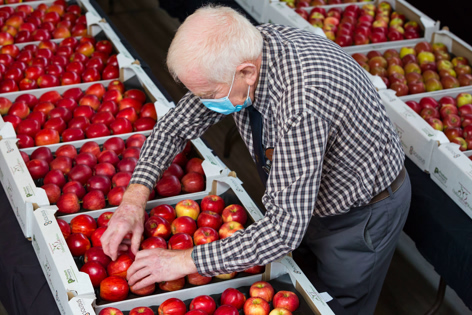
Below: Judges; right to left; Colin Bird, Charnee Butcher, Caroline Ashdown and Ryan Williams
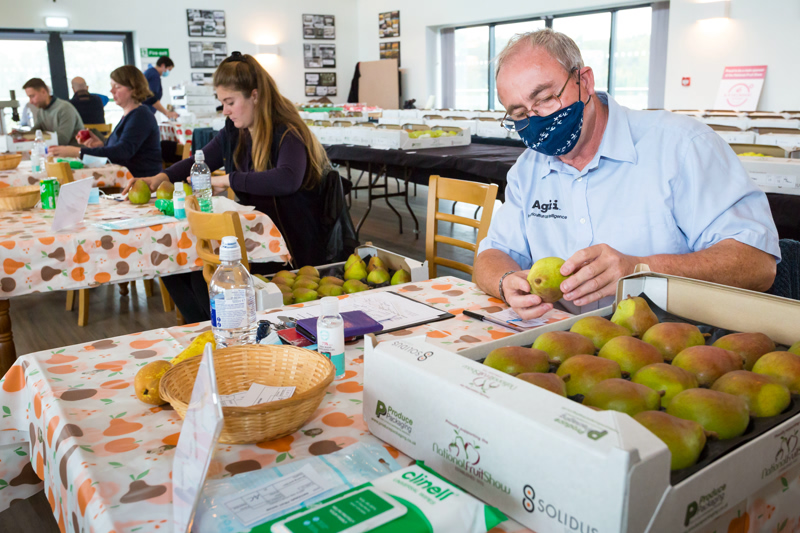
Below: hard at it! - L-R. Nigel Jenner, Colin Bird, Caroline Ashdown, Charnee Butcher
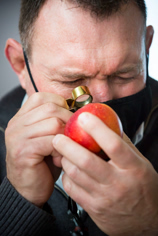
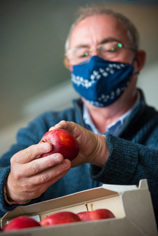
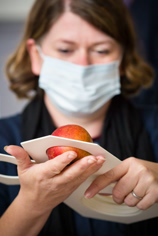
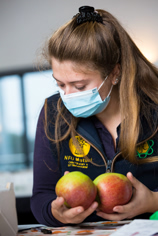
Below: left; Judges Ryan Williams and Jack Roberts & right; Wendy Johnson and Norma Tompsett processing judges scorecards
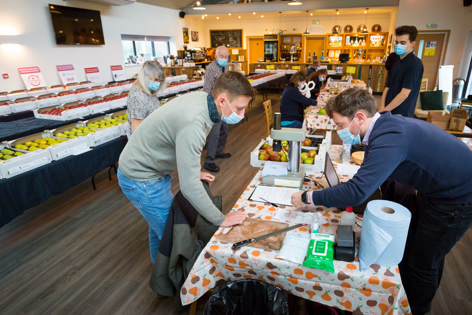
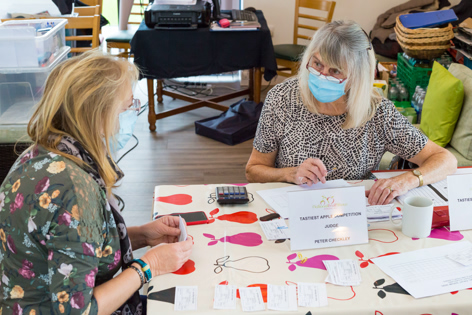
Below: the tastiest apple judges; Peter Checkley. Stuart Guest, John Guest and Emma Croucher our Steward with Chief Steward Brian Tompsett
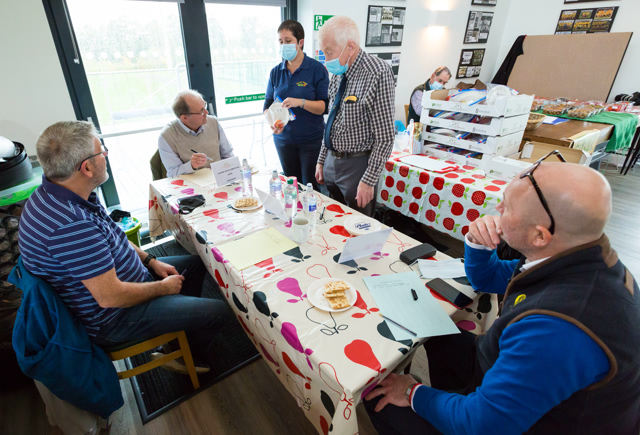 The Tastiest Apple Competition has had a high profile for many years.
The Tastiest Apple Competition has had a high profile for many years.
The EAM remembers Spartan winning back in the 1970's and for many years what would be described as traditional varieties took the honours, however as new modern varieties came on stream, Rubens took the honours; however, occasionally Jazz (in an early season) became an occasional winner.
With climate change and earlier maturing seasons, Jazz has been the NFS tastiest apple for several years.
Once again Jazz triumphed at this years show, with the 2020 tastiest apple grown by Chandler & Dunn at Lower Goldstone Farm, Ash, Canterbury, East Kent.
Below: left; Tastiest apple Steward Emma Croucher & Stuart Guest - & right; Jazz judged the Tastiest Apple grown by Chandler & Dunn
The winning Jazz grown by Chandler & Dunn - Richard Chandler, Clive Chandler, Charlie Dunn and Peter Chandler proudly pose by a bin of Jazz.
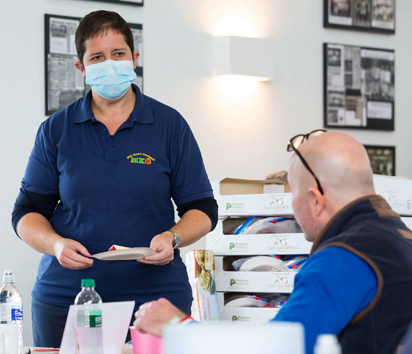
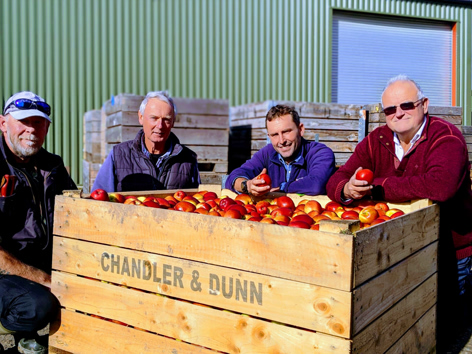
Below: left; Soft Fruit Competition entries and right; Jimmy Edwards judging the Nut Competition
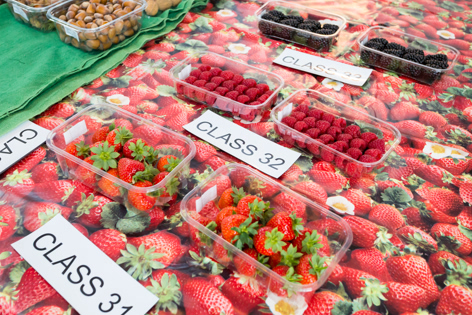
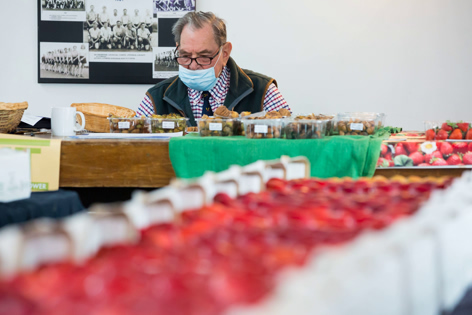
Below: President Teresa Wickham and Chair Sarah Calcutt with 'Best in Show' winner
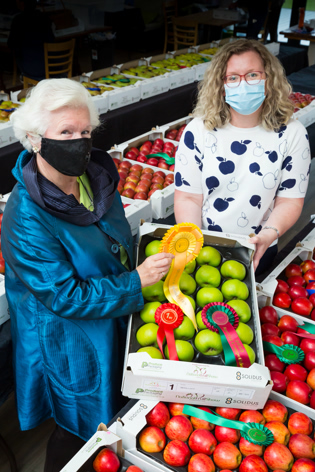 The 2020 VIRTUAL National Fruit Show was a great success and there is so much more to share with my readers.
The 2020 VIRTUAL National Fruit Show was a great success and there is so much more to share with my readers.
Next week The English Apple Man Journal will feature more of the presentations.
In last week's Journal The English Apple Man featured Lord John Krebs opening of this year's National Fruit Show.
This week features John Giles presentation which was part of the afternoon session.
 John Giles - Divisional Director of Agri Food
John Giles - Divisional Director of Agri Food
"With experience in market research, global markets and strategy development, I love the variety of my job. I have been able to travel to India, Chile, South Africa, China and more, although I take equal satisfaction from projects closer to home. There is, literally, never a dull moment in Promar"
John Giles - WHAT DID I SAY AT THE NATIONAL FRUIT SHOW THIS WEEK?
"Earlier on this week, I was asked by the Worshipful Company of Fruiterers to join their afternoon session at the National Fruit Show held in conjunction with the Fresh Produce Journal. This event is normally held at Detling in Kent, but of course this year was held on a virtual basis.
 I was fortunate to be asked to join the afternoon session and join a panel discussion - chaired by my good colleague, Laurence Olins. Chris Newenham, who co-ordinated all of this, asked me to speak about "what's going on - and something international!".
I was fortunate to be asked to join the afternoon session and join a panel discussion - chaired by my good colleague, Laurence Olins. Chris Newenham, who co-ordinated all of this, asked me to speak about "what's going on - and something international!".
In terms of what is going on - the answer of course is "lots". To try and capture this in 25 minutes was always going to be a bit of a challenge. I decided to focus on three things:
- supply chain shocks
- routes to market
- exports - and the role of the UK
Here goes then
.
Supply chain shocks
In terms of supply chain shocks, such as the possibility of a Hard Brexit and of course COVID 19, there seem to be some common themes. From our work at Promar, we believe that "shocks" tends to accentuate and accelerate what's already happening. Well organised and structured companies tend to get through these difficult times, but some will fail - but this presents opportunities for others.
We also see that supply chains will be stress tested by major customers and will need to be more sustainable and resilient than ever before. The Big Ticket issues that people were talking about in mid March 2020 won't go away - the New Agricultural Bill, the Food Strategy, the development of low carbon supply chains, removal of plastics etc.
This all points to a need for a new level of understanding of customers and consumers and the need to be (very) good managers of our businesses. In terms of the future economic outlook, with the impact of both COVID 19 and regardless of what sort of Brexit we end up with - this, to us, looks challenging to say the least. But make your own mind up.
Much depends on how severe the recent rise in COVID infections, and sadly, deaths turns out to be. It looks, though, as if things might well get worse before they get better.
Changing routes to market
In terms of routes to market for fresh produce companies, change has happened quickly and in some cases is permanent. Foodservice sales have all but collapsed. Even the re-opening of pubs, restaurants and hotels in early July did not guarantee a full return to normal in this route to market. COVID restrictions are being re-introduced to some parts of the UK, as we move through the late autumn period, as re infection rates soar again. The foodservice market once again looks vulnerable.
Online selling though has boomed in this period. This was something that had already begun to be a more prominent feature of the UK supply chain. Supermarkets that have invested in home delivery systems have done better than others, as have those who have a more "neighbourhood/local" structure to their store portfolio.
Niche routes to market, such as farm shops have also done well. Up to 90% of them have reported significant increases in sales, although their overall share of the UK food market is still relatively modest at around £2 billion per annum in total.
In the latest developments in the UK retail sector, ASDA, the number 3 retailer has been bought from the US owned Walmart after 21 years for £6.8 billion by the Issa brothers and TDR Capital. It is reported they will invest over £1 billion in the next three years to further strengthen Asda's business and its supply chain and grow its convenience and online operations.
Exports - produce or agri tech?
With regards to the development of UK exports in the fresh produce sector, our view is to "never say never ", but exports are not really in our DNA. When we have exported, these have historically been to the EU. As a result, the future question of what sort of market access we have with Europe comes back in to play.
Exports are hard work and factors such as volatile exchange rates and the development of strong customer relationships and new levels of market knowledge are highly important. The real action in the fresh produce sector is in SE Asia and other emerging markets. While some UK businesses might find success here, it is not maybe an "industry answer" to the future challenges ahead.
Where the UK might do better is in the area of agri tech. This is a global market in its nature and reported to be worth some US$ 400 billion market. It covers the entire supply chain with huge potential demand for solutions to complex problems/challenges, such as supply chain resilience, water, climate change, the environment, labour and the opportunities bought about by the development of a digital data driven economy.
UK supermarkets are world class - and have driven supply chain excellence and as a result, UK commercial, R & D and academic expertise is valued around the world.
What did I conclude?
Conclusions for my session: COVID - maybe the real impact is still to be felt over the next 3 - 6 - 9 - 12 months.
Brexit - how close to a Hard Deal are we? Time is running out even for what is termed as a "skinny Brexit". Maybe we are closer to a Hard Brexit than we would probably like. There might be opportunities to replace some EU imports, but these are not automatic. To achieve this, there is a need for access to land, labour and finance - and time (it takes 3 years to develop an apple orchard).
Customers and consumers might well like the idea of more British produce - but often at no extra cost to them and history shows that others might invest in the UK as well.
The routes to market in the UK are changing - maybe for good? We must use social media to communicate with customers and consumers if we want them to buy our produce. UK exports? These are not really in our DNA and agri tech opportunities look might look better.
There was some good discussion with the rest of the panel - grower Peter Thompson, Reading University R &D specialist, Tobias Lane and Richard Harrison from NIAB - EMR. And all ably chaired by Laurence - as always.
Well done the National Fruit Show, the FPJ and the Worshipful Company of Fruiterers for making this happen.
There - how's that for a Thursday afternoon in Kent?
John Giles
That is all for this week ![]()
Take care
The English Apple Man